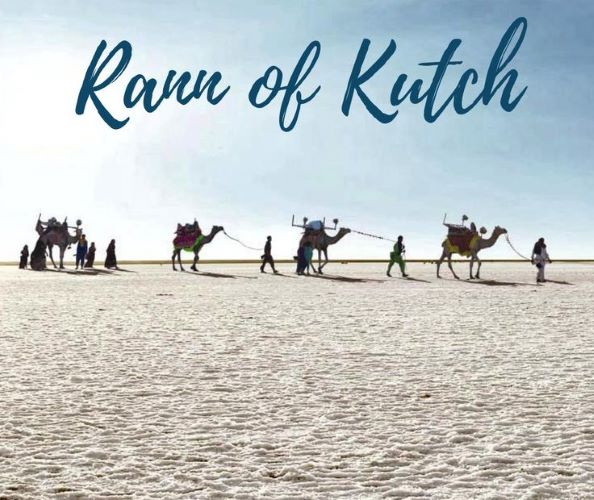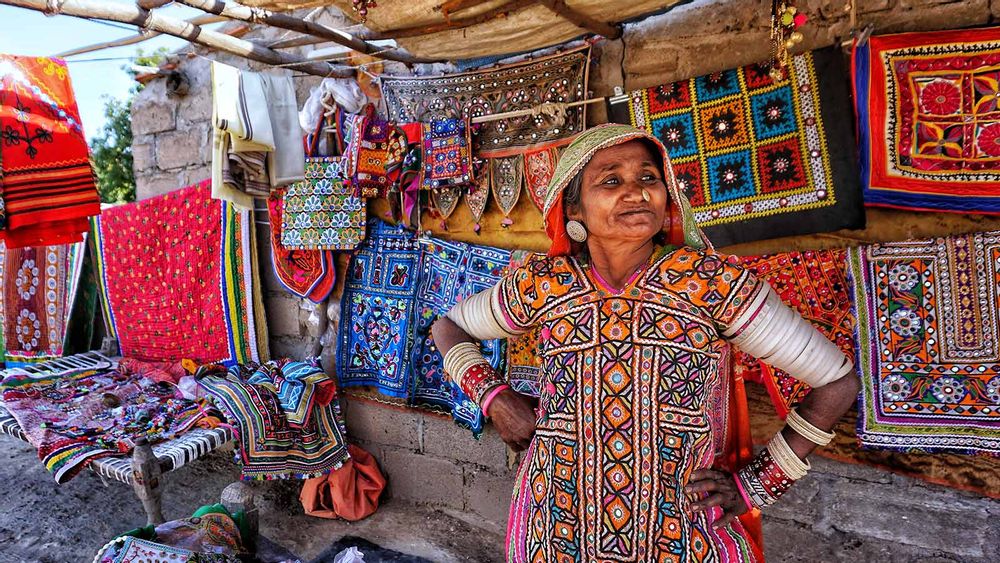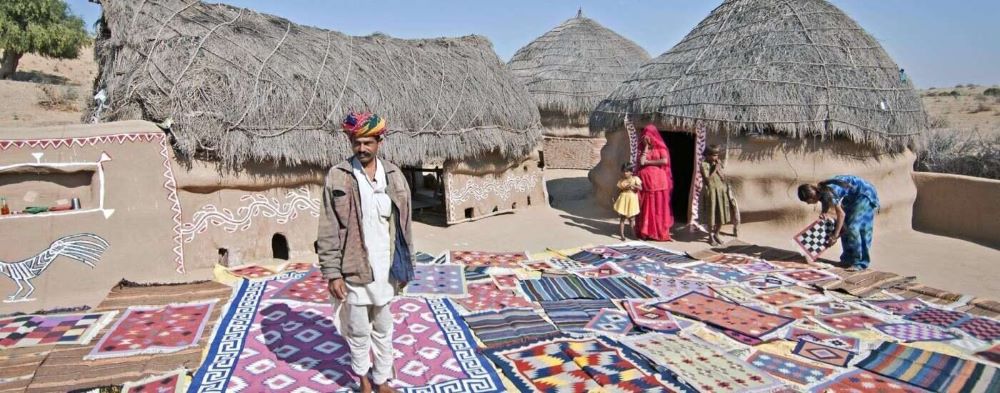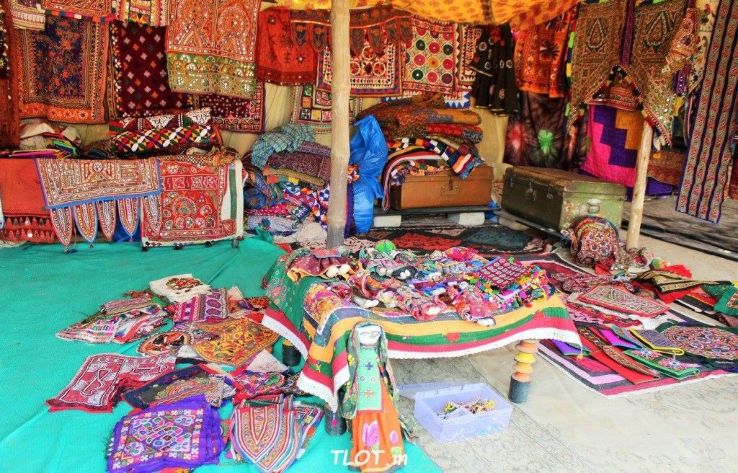
- Sindhi community launches online drive requesting Indian govt. for creating Sindh State in Kutch area
- Sindhi community argues that Ruler of Kutch had granted them land at the time of partition while Indian Constitution also provides for creating on the basis of language and culture of a particular community
Sindh Courier Monitoring Desk
Kolkata
Sindhi community of India has launched a signature drive requesting the government for creating a separate state of Sindh in Kutch area to preserve and promote Sindhi language and culture.
In a petition addressed to the President and Prime Minister of India, signed by Sindhis from across the country, it has been argued that a parcel of land was granted by the ruler of Kutch to Sindhis who migrated from Sindh in post partition period of India. Due to some reason, this land was not utilized as an administrative unit as a State for Sindhis. This can be now considered for the formation of a State for Sindhis.
They have further argued that there is a provision in the Constitution of India in Articles 2, 3 and 4 to constitute a State on the basis of language and culture of a particular community.
Creation of separate state for Sindhis is a longstanding demand however the fresh online movement has been launched by Mr. Mahesh Kumar Malkani of New Alipore, Kolkata West Bengal. The online petition is being signed by Sindhis from different states of India.
 A website titled ‘Demand for a separate state of Sindh in Bharat’ has been created through which the Sindhis have pleaded their case this way:
A website titled ‘Demand for a separate state of Sindh in Bharat’ has been created through which the Sindhis have pleaded their case this way:
We Sindhis were a prosperous community in urban Sindh before the partition. However, due to concerns of religious persecution and the influx of Muslim refugees from India, we were compelled to migrate to India. It was challenging for us to establish our economic footing in a new land without a permanent homeland. As a result, we had to settle in states that were vastly different from the Sindhi culture we were accustomed to.
Based on the information gathered from reliable sources such as Google, allow me to present some noteworthy facts:
- The Sindhi population in India is 10 million and approximately, 10 million abroad.
- Sindhis contribute significantly to the GDP of India, accounting for about 20%.
- A considerable portion, around 24%, of the total Income Tax collected in India is contributed by Sindhis.
- Furthermore, Sindhis contribute a substantial 62% of the Charity Fund in India.
While there are numerous challenges, it is important to note that our country possesses vast areas of untapped and barren land that could be designated as separate territories.
Providing further information:
– Goa, the smallest state in India, spans an area of 3,700 square kilometers and has a population of approximately 1.5 million.
– Sikkim, the least populous state in India, has a population of 6, 00,000.
Size may not be paramount, but recognition certainly is.
It is disheartening to observe that communities without a designated state often experience a gradual erosion of their culture, language, and identity. Unfortunately, we have also experienced this phenomenon. Throughout the extensive period of 75 years of partition, the government has been unable to designate a portion of the country as a “SINDH STATE”, despite our willingness to sacrifice our entire state to facilitate the division of Pakistan, in accordance with the decisions made by our leaders. It is imperative that the Indian government fulfills its responsibility to establish a Sindh State within Bharat, in order to safeguard our ancient civilization which spans over 5,000 years. Hence, we earnestly request the Indian government to grant us a separate State of Sindh in Bharat.
***
 Following is the text of letter/petition from the Sindhi Community addressed to President and Prime Minister of India:
Following is the text of letter/petition from the Sindhi Community addressed to President and Prime Minister of India:
This letter needs the study of the canvas on which the prayer is to be printed. It is about the sad neglect of the community who had been convinced to leave their homeland with the promise of being taken care of in Hindustan.
After the partition of India, the majority of the minority Hindus and Sikhs in Pakistan migrated to India, while the Muslim migrants from India settled down in Pakistan. Approximately 10 million Hindus and Sikhs migrated to India, while nearly an equal number of Muslims migrated to newly-created Pakistan from India. Hindu Sindhis were expected to stay in Sindh following the partition, as there were good relations between Hindu and Muslim Sindhis. At the time of partition there were 14, 00,000 Hindu Sindhis, through most were concentrated in cities such as Hyderabad, Karachi, Shikarpur, and Sukkur. However, many Sindhi Hindus decided to leave Pakistan.
Problems were further aggravated when incidents of violence broke out in Karachi after partition. According to the census of India 1951, nearly 7, 76,000 Sindhi Hindus were forced to migrate to India to avoid conversion to Islam. Despite this migration of Hindus, a significant Sindhi Hindu population still resides in Pakistan’s Sindh province where they numbered around 2.28 million in 1998 and 4.21 million in 2017 as per the 2017 census of Pakistan, while the Sindhi Hindus in India numbered 2.57 million in 2001. As of 2011, Sindhi population was around 2.77 million, out of which around 1.7 million (17 lakh) speak Sindhi and around 1 million speak Kachhi.
The responsibility of rehabilitating refugees was borne by the respective state government, and refugee camps were set up for Hindu Sindhis. Many refugees have overcome the trauma of poverty, though the loss of a homeland has had a deeper and lasting effect on their Sindhi culture. In 1967, the Government of India recognized Sindhi language as the fifteenth official language of India, in two scripts. In late 2004, the Sindhi Diaspora vociferously opposed a Public Interest Litigation in the Supreme Court of India, which asked the Government of India to delete ‘Sindh’ from Indian National Anthem on the grounds that it infringed upon the sovereignty of Pakistan.
We keep reading about this in various online links, and lots of information is available regarding the inclusion of the language in the Eighth Schedule too.
 It is told that after partition, Sindhi refugees became a linguistic, electoral, and cultural minority in India without a linguistic province to which they could claim belonging. Unlike Punjab, Bengal and Assam, Sindh was not portioned in 1947. The formation of linguistic provinces in 1956 posed a fresh problem: the making of new linguistic minorities who faced social, political, and economic marginalization in the new linguistic states. Rita Kothari has described how, after partition, the de-territorialized and dispersed Sindhis sought to use language as the nucleus of their cultural identity. In the absence of a linguistic state, they strove to acquire a “symbolic” Indianness for themselves in seeking official recognition for Sindhi in the Eighth Schedule of the Constitution, a list of languages that are eligible for support from the central government. It was not only a cultural elite that had experienced a humiliating fall in social standing who sought to reclaim their status via the Constitution (and for whom state patronage was also important), but also poorer refugees who pentioned for constitutional protection for Sindhi language as they believed this would strengthen their demands for educational provision in the language, in the absence of provincial assistance.
It is told that after partition, Sindhi refugees became a linguistic, electoral, and cultural minority in India without a linguistic province to which they could claim belonging. Unlike Punjab, Bengal and Assam, Sindh was not portioned in 1947. The formation of linguistic provinces in 1956 posed a fresh problem: the making of new linguistic minorities who faced social, political, and economic marginalization in the new linguistic states. Rita Kothari has described how, after partition, the de-territorialized and dispersed Sindhis sought to use language as the nucleus of their cultural identity. In the absence of a linguistic state, they strove to acquire a “symbolic” Indianness for themselves in seeking official recognition for Sindhi in the Eighth Schedule of the Constitution, a list of languages that are eligible for support from the central government. It was not only a cultural elite that had experienced a humiliating fall in social standing who sought to reclaim their status via the Constitution (and for whom state patronage was also important), but also poorer refugees who pentioned for constitutional protection for Sindhi language as they believed this would strengthen their demands for educational provision in the language, in the absence of provincial assistance.
Sindhi day or Sindhi Language Day is celebrated on 10th April every year. It was on 10th April 1967 when Sindhi Language was included in Eight Schedule of the Indian Constitution, and since then, this day is celebrated as Sindhi Day.
Sindhis have always made their
Also read: Kutch from Kingdom to District
Sindh wherever they have settled by living close to each other and enjoying all festivals together and being beside each other for safety and security. However, not having their own state has not helped the language and culture grow; in fact, there is a risk of it becoming extinct. The language cannot be included in schools as most states have a very small population and the culture is soon becoming a fusion with various state cultures. It is an established fact that no language has ever survived in absence of it being used in running the Government. It is a myth to believe that of Sahitya Academy awards, scholarship, etc. will result in survival of the language. A very deep concern is that Sindhis are increasingly using the language of the region they are living in, and thus, Sindhi language is slowly dying. The glaring example is non-implementation of the reports of the Commissioner for Linguistic Minorities in India, though the reports are being placed in the Parliament through the President of India. As per the website of the Commission, the last report was published in 2015. After that, no report has been published. This clearly establishes that there is no concern of the Government to look into the status of Sindhi language in India. There is no assessment available in the public domain as to what happened to the glaring lapses recorded in published 52 reports of the Commission. Sindhis are bound to use the language used locally for their day-to-day survival, in office of Collector, police station, tehsil, court, etc. If we look into the historical mirror, we see that people always adopted the language of the ruler.
Sindhis had the opportunity to establish their educational institutions, getting the benefit of linguistic minority community prior to enactment of National Commission for Minorities Act, 1992 and National Commission for Minority Educational Institutions Act, 2004. Now, Sindhis are deprived of establishing their Educational Institutions, and the Sindhi community has lost the right to education in their mother tongue.
No State in India made any attempt to find out the caste system of Sindhs in their States to give benefits of reservation in government jobs or in other matters as per policy, though the caste system existed in Hindu Sindhis in Sindh as per the census of Sindh done in 1931. This injustice can be mitigated if a State is formed for Hindu Sindhis. The government of Sindh will do needful in getting the details of the caste of Hindu Sindhis on the basis of records available with the government, whether in India or Pakistan, or anywhere else, and make available benefits of the reservation policy of India.
A lot of difficulties are being faced by Hindu Sindhis coming from Pakistan to settle in India due to religious persecution, because the administration lacks the empathy to Sindhis who are unable to understand the local language of the administration. There is a serious gap of language between immigrants and local administration.
There is no scope for a Sindhi to make a place in regional films, TV, music, etc. without a separate state. Look at superstar, Jeet, who is a Sindhi superstar of Bengali films. Bollywood stars like Ranvir Singh and Kiara Advani who would have definitely thought of regional Sindh platform if there was a separate state with demand for Sindhi films, serials etc. Sindhi singers cannot think of a future beyond Sindhi shows and weddings, etc. These are very few basic examples of disadvantages of not having a separate state. The provision in the Constitution in Article 29 regarding the right to conserve Sindhi language, script and culture is highly lagging behind due to inadequate attention of the State Governments in formation of Sindhi Sahitya Academies and provision of funds. Out of about 36 States and UTs, only 7 Sindhi Sahitya Academies are formed, and that too are not working satisfactorily. There is no scope of Sindhis to study and research their historical background of political economic cultural past and take pride in their ancestors. This is causing great injustice to the present generation as they have no knowledge of their great scientists, sculptors, historians, economists, religious leaders, and the same situation will prevail for future generations. We fully agree with the detailed discussion done by the Commission constituted on State reorganization in 1953, in its report of 1955 which are largely relevant for the Sindhi community in formation of a State for Sindhis.
Read more: Dr. Parso J. Gidwani – The man who found indigenous Sindhis in Kutch
The hope of Sindhis remains a dream with each political party making promises that are always broken. Yet, the Sindhi does not give up and keeps making submissions and prayers, and this letter is yet another prayer to fulfil the dream of the Sindhi community of having their own State.
 We, the Sindhis of India and abroad are representing the community through this letter and praying for a separate State for the community which has the highest tax prayers, industrialists proving employment, social workers building hospitals, homes, schools and colleges. Every Sindhi is living peacefully in whichever state he is born in or settled in, but his identity culture and language is at the risk of becoming extinct if there is no State to call his own, a State which will speak the Sindhi language, which will boast of the rich culture of Sindhis and which will work constantly for the development and growth of the same. The fact remains that the formation of States in India is based on the language of the majority of people being spoken in that region as per the provision in the Indian Constitution. We can identify the region where a sizeable number of people are speaking in Sindhi. That can be the Sindh for Sindhis, and this will help in survival of the language, and with this, the Sindhi culture will be protected and preserved. We have already got a clear vision and understanding that the State working in Sindhi language will only be able to allow the survival of the Sindhi language, hence, we have no other option but to demand the formation of Sindhi state on the basis of Sindhi language. There is a provision in the Constitution of India in Articles 2, 3 and 4 to constitute a State on the basis of language and culture of a particular community. Therefore, there is a humble demand of the Sindhi community to form a State for the Sindhi Community on the line of formation of linguistics States such as Andhra Pradesh, Kerala, Karnataka, etc. A parcel of land was granted by the ruler of Kutch to Sindhis who migrated from Sindh in post partition period of India. Due to some reason, this land was not utilized as an administrative unit as a State for Sindhis. This can be now considered for the formation of a State for Sindhis. The formation of the State will solve the long pending grave problems of the Sindhi community of preservation of their language, culture, economic development and political aspirations.
We, the Sindhis of India and abroad are representing the community through this letter and praying for a separate State for the community which has the highest tax prayers, industrialists proving employment, social workers building hospitals, homes, schools and colleges. Every Sindhi is living peacefully in whichever state he is born in or settled in, but his identity culture and language is at the risk of becoming extinct if there is no State to call his own, a State which will speak the Sindhi language, which will boast of the rich culture of Sindhis and which will work constantly for the development and growth of the same. The fact remains that the formation of States in India is based on the language of the majority of people being spoken in that region as per the provision in the Indian Constitution. We can identify the region where a sizeable number of people are speaking in Sindhi. That can be the Sindh for Sindhis, and this will help in survival of the language, and with this, the Sindhi culture will be protected and preserved. We have already got a clear vision and understanding that the State working in Sindhi language will only be able to allow the survival of the Sindhi language, hence, we have no other option but to demand the formation of Sindhi state on the basis of Sindhi language. There is a provision in the Constitution of India in Articles 2, 3 and 4 to constitute a State on the basis of language and culture of a particular community. Therefore, there is a humble demand of the Sindhi community to form a State for the Sindhi Community on the line of formation of linguistics States such as Andhra Pradesh, Kerala, Karnataka, etc. A parcel of land was granted by the ruler of Kutch to Sindhis who migrated from Sindh in post partition period of India. Due to some reason, this land was not utilized as an administrative unit as a State for Sindhis. This can be now considered for the formation of a State for Sindhis. The formation of the State will solve the long pending grave problems of the Sindhi community of preservation of their language, culture, economic development and political aspirations.
The community has finally found a Prime Minister who acknowledges the presence of Sindhis, and the community finds a place in his speeches. We have strong faith in the fact that this demand will be looked into and positive steps will be taken in this direction.
__________________
Courtesy: Demand For Sindh State In Bharat